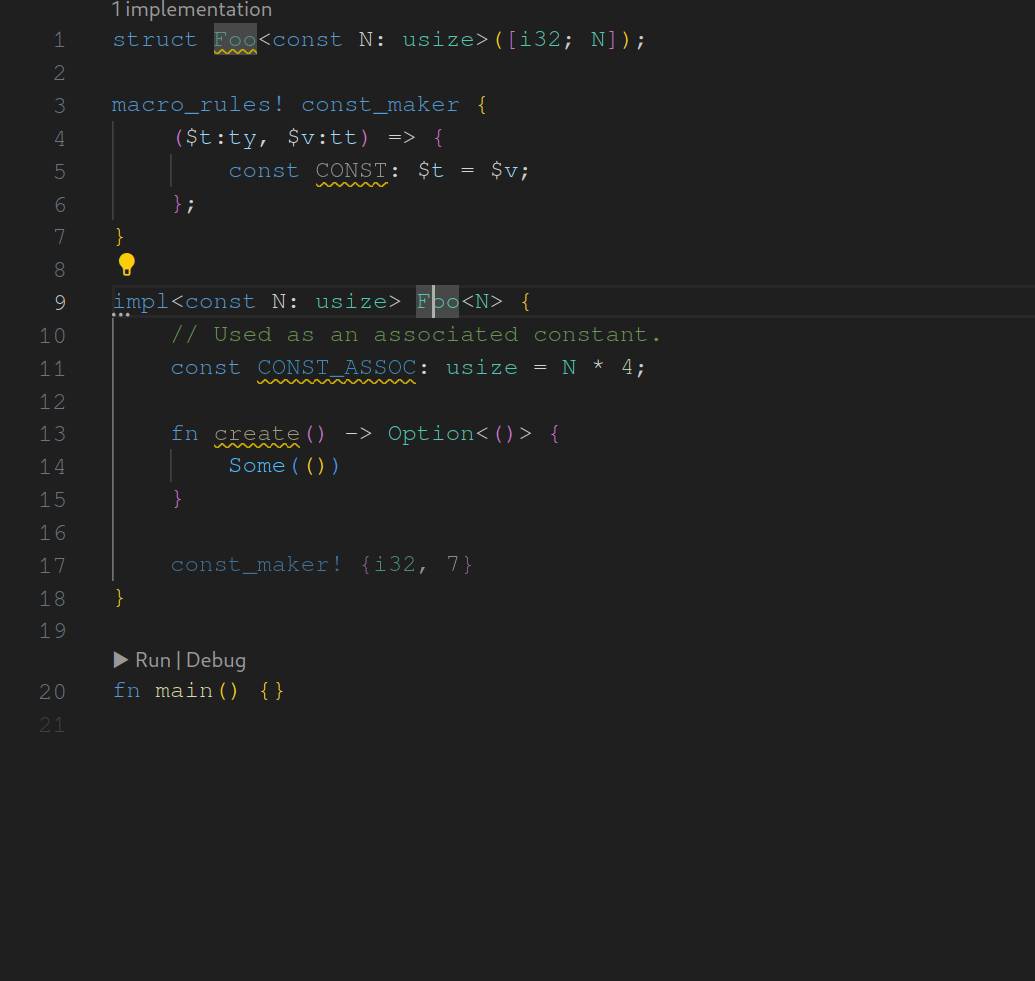`clone_for_update` is relatively cheap in comparison, since making a
node require parsing an entire source text
Adds a test to make sure that it doesn't crash when multiple uses are
present.
`does_not_fill_wildcard_with_wildcard`
and `does_not_fill_wildcard_with_partial_wildcard_and_wildcard`
both made no modifications to the code,
which is a problem for mutable ast porting as it generates a best-effort
minimal set of text edits,
and assists require at least one text edit.
Can actually split out adding the functions from getting the impl to
update or create thanks to being able to refer to the impl ast node.
FIXME Context:
Unfortunately we can't adjust the indentation of the newly added function
inside of `ast::AssocItemList::add_item` since for some reason the `todo!()`
placeholder generated by `add_missing_impl_members` and
`replace_derive_with_manual_impl` gets indented weirdly.
Implement recursion in mir interpreter without recursion
This enables interpreting functions with deep stack + profiling. I also applied some changes to make it faster based on the profiling result.
Unify getter and setter assists
This PR combines what previously have been two different files into a single file. I want to talk about the reasons why I did this. The issue that prompted this PR ( and before I forget : this pr fixes#15080 ) mentions an interesting behavior. We combine these two assists into an assist group and the order in which the assists are listed in this group changes depending on the text range of the selected area. The reason for that is that VSCode prioritizes actions that have a bigger impact in a smaller area and until now generate setter assist was only possible to be invoked for a single field whereas you could generate multiple getters for the getter assist. So I used the latter's infra to make former applicable to multiple fields, hence the unification. So this PR solves in essence
1. Make `generate setter` applicable to multiple fields
2. Provide a consistent order of the said assists in listing.
Don't show `unresolved-field` diagnostic for missing names
I don't think reporting ``"no field `[missing name]` on type `SomeType`"`` makes much sense because it's a syntax error rather than a semantic error. We already report a syntax error for it and I find it sufficient.
assist : generate trait from impl
fixes#14987 . As the name suggests this assist is used to generate traits from inherent impls while adapting the original impl to fit to the newly generated trait. I made some decisions regarding when the assist should be applicable. These are surely open to discussion. I looking forward to any feedback.

Disable remove unnecessary braces diagnotics for self imports
Disable `remove unnecessary braces` diagnostic if the there is a `self` inside the bracketed `use`
Fix#15191
Support GATs in bounds for associated types
Chalk has a dedicated IR for bounds on trait associated type: `rust_ir::InlineBound`. We have been failing to convert GATs inside those bounds from our IR to chalk IR. This PR provides an easy fix for it: properly take GATs into account during the conversion.
Map our diagnostics to rustc and clippy's ones
And control their severity by lint attributes `#[allow]`, `#[deny]` and ... .
It doesn't work with proc macros and I would like to fix that before merge but I don't know how to do it.
internal: Format let-else
As nightly finally got support for it I went ahead and formatted r-a with the latest nightly, then with the latest stable (in case other stuff changed)
Split out project loading capabilities from rust-analyzer crate
External tools currently depend on the entire lsp infra for no good reason so let's lift that out so those tools have something better to depend on